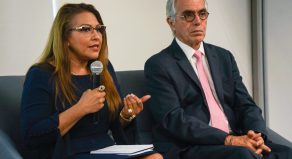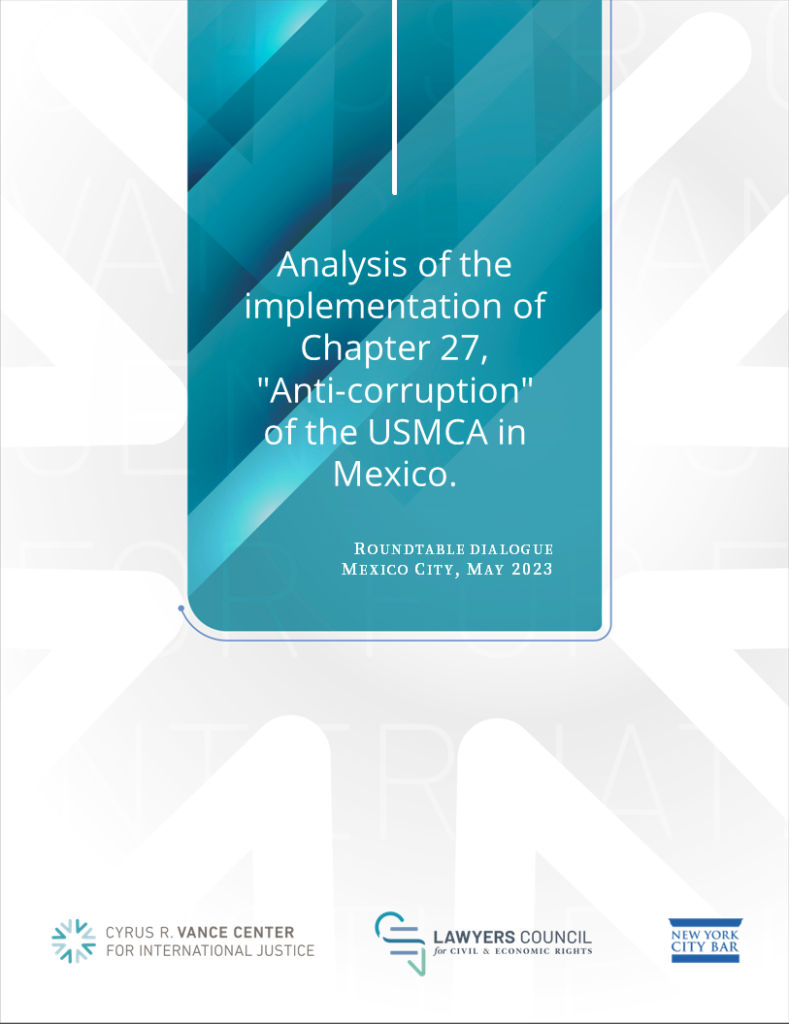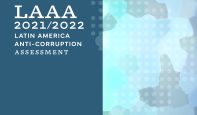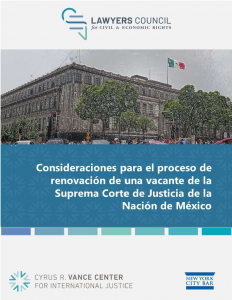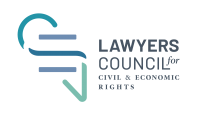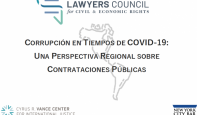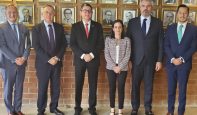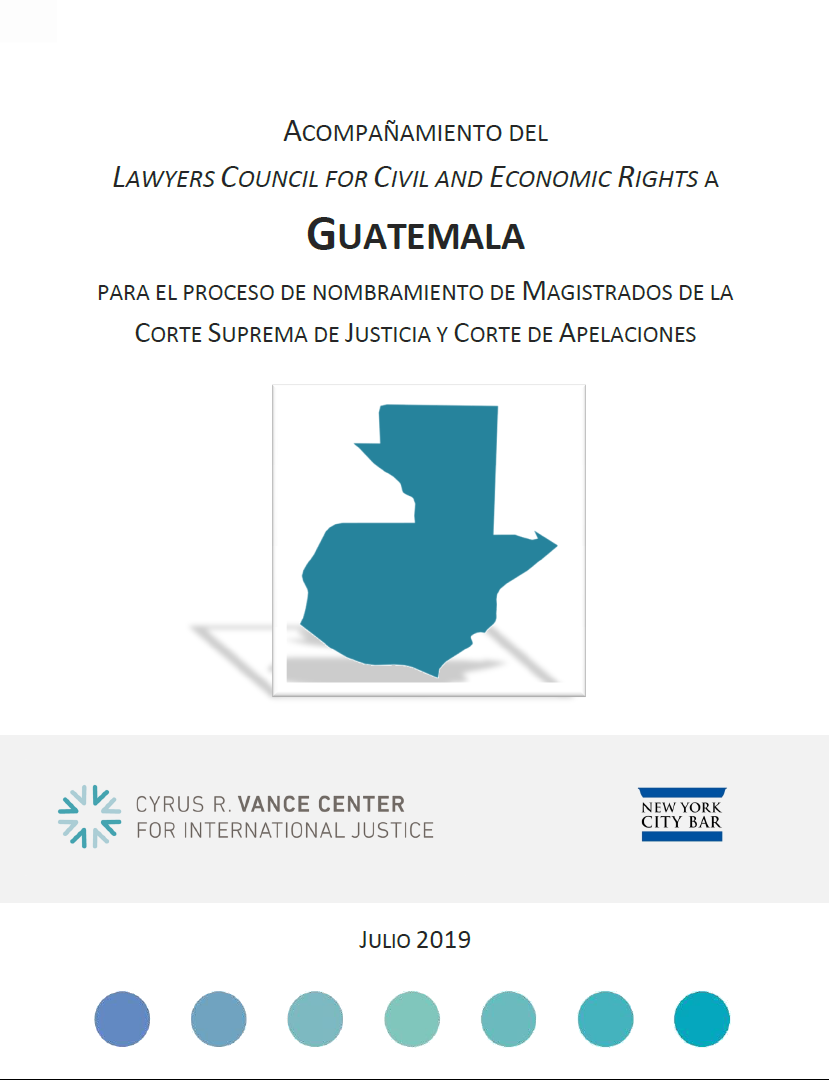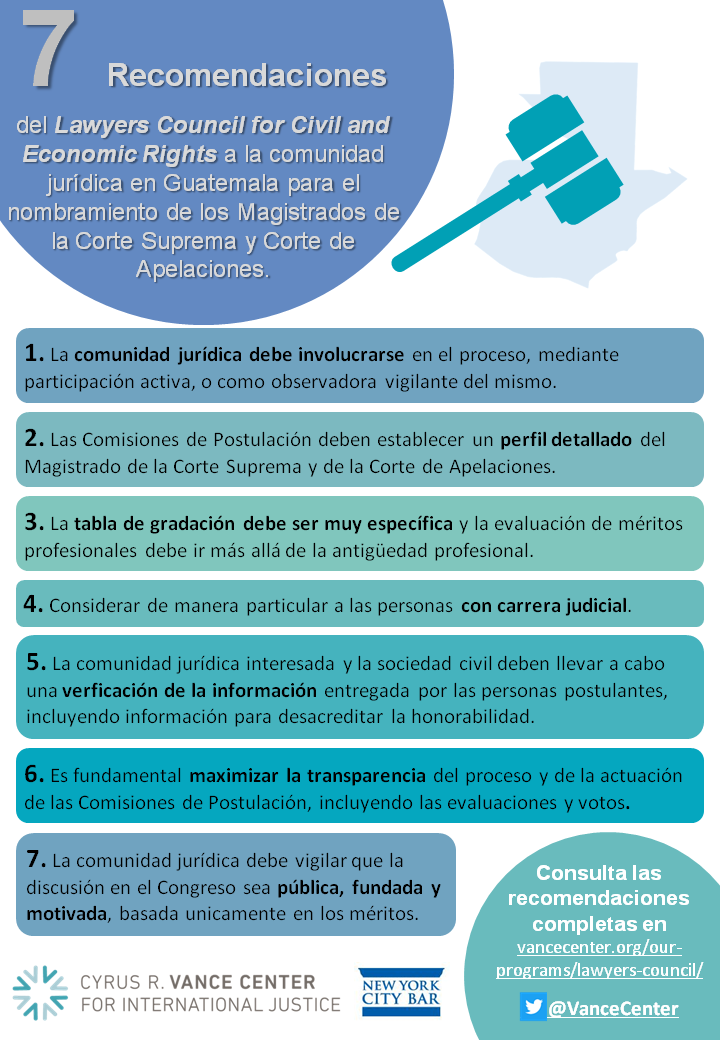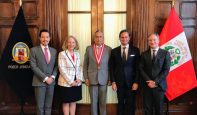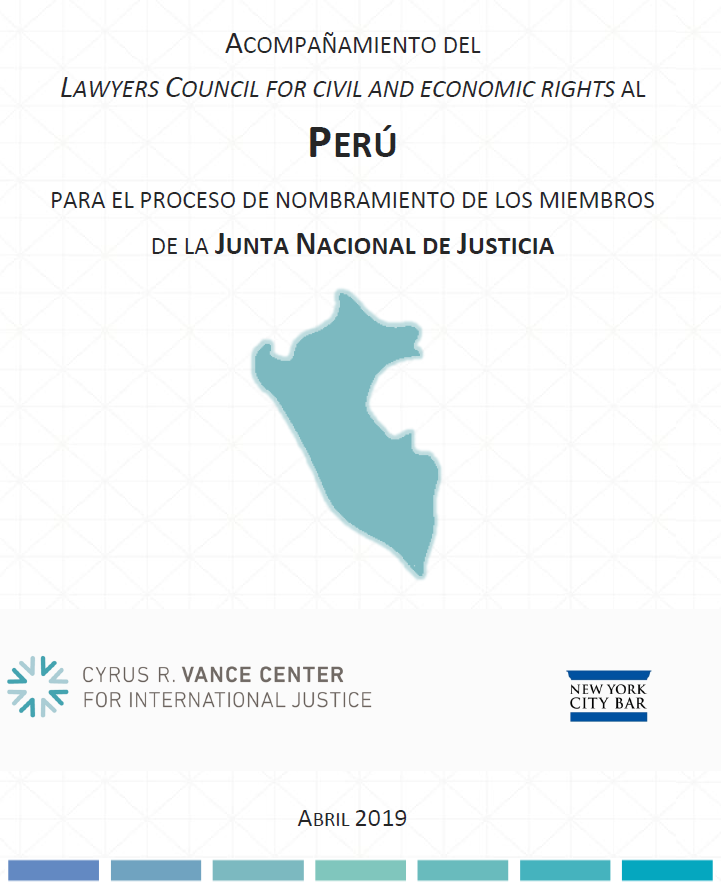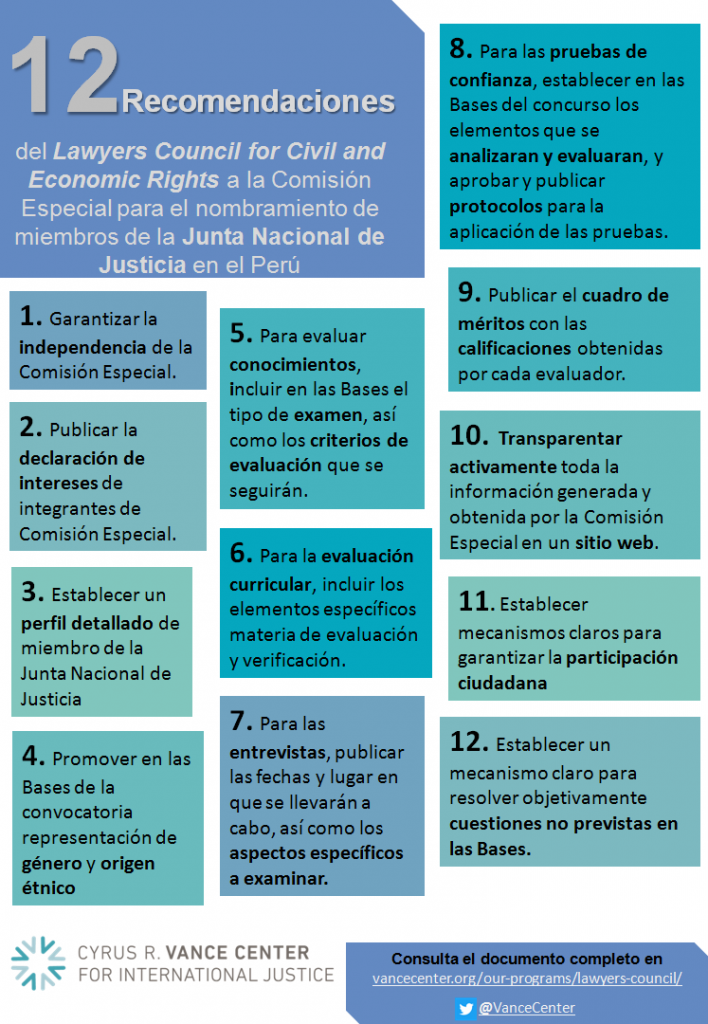Lawyers Council for Civil and Economic Rights
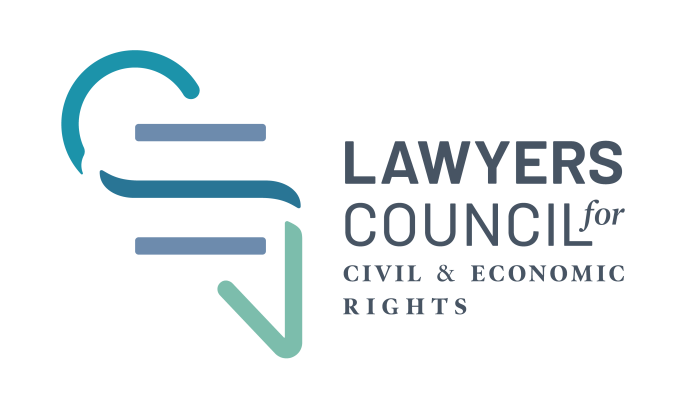
The Cyrus R. Vance Center for International Justice’s Lawyers Council for Civil and Economic Rights convenes private-practice attorneys across the Americas to support the rule of law, the critical work of civil society, and to combat corruption throughout the region. The Council consists of eighteen lawyers from the United States and thirteen Latin American countries with experience as leaders of bar associations, board members of non-governmental organizations, and pro bono practitioners.
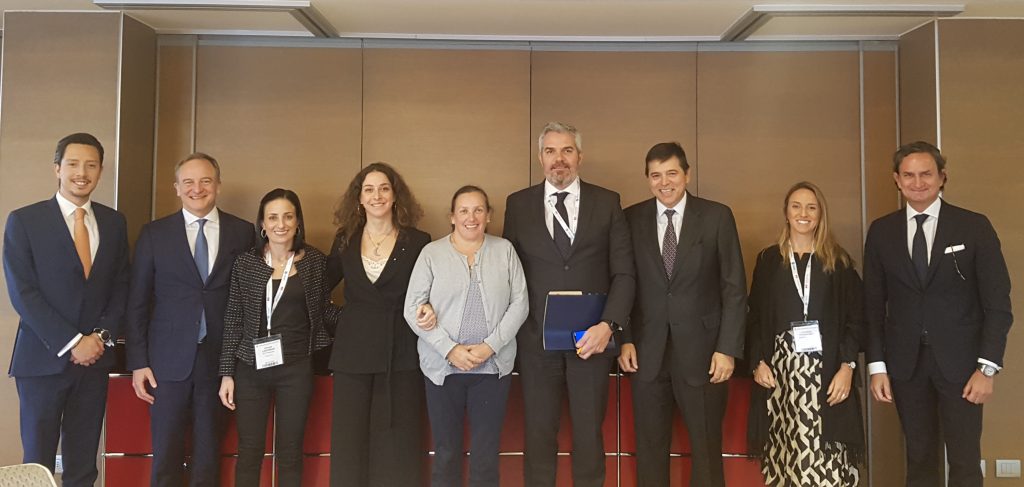
The Lawyers Council designs and implements multilateral, region-wide initiatives to address challenges to civil and economic rights in Latin America.
- Anticorruption Initiative
The Council is convinced that corruption is one of the region’s most pressing challenges, given its complexity, intractability, and destructive effects on the rule of law. This initiative seeks systematically to map and guide legal efforts in Latin America to prevent and redress corruption, a widespread issue that handicaps business and society. The initiative expands on current practice by looking beyond formal measures at actual experience from the perspective of a broad range of lawyers.
- Strengthening Judicial Independence
The Lawyers Council views an independent judiciary as a key element of the rule of law. This initiative seeks to engage with key sectors of the legal profession in countries in Latin America to assess the processes of appointment of members of the judiciary, as well as support efforts to build institutional capacity for independent courts.
- Strengthening Civil Society
The Council seeks to identify legal impediments to operating civil society organizations independently, and free from government overreaching. These efforts are designed to rally the legal profession to strengthen the rights and resources that will allow civil society to work effectively for the common good.
Council Members
Projects
Analysis of the Implementation of Chapter 27, "Anti-corruption" of the USMCA in Mexico
Policy Brief from the Roundtable Dialogue...
Analysis of the Implementation of Chapter 27, "Anti-corruption" of the USMCA in Mexico
On May 9, 2023, the Vance Center convened a roundtable discussion in Mexico City entitled “Analysis of the Implementation of USMCA Chapter 27: Anti-corruption.”
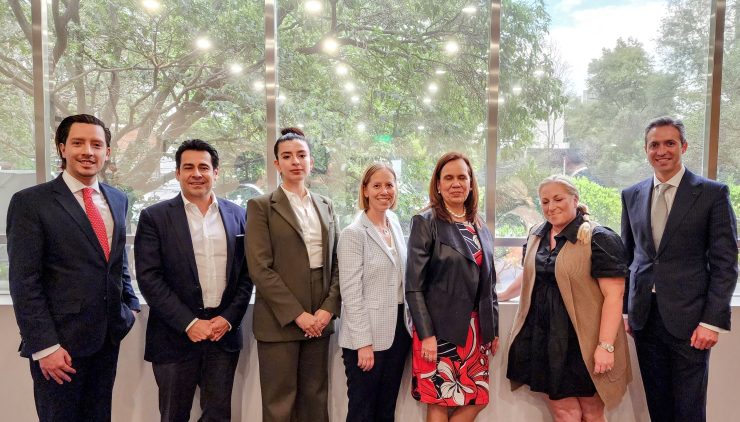
Organizers and participants in the Vance Center’s USMCA anti-corruption roundtable discussion in Mexico City, May 9, 2023. (Photo credit: Jaime Chávez Alor)
The event drew a diverse set of participants, including public officials from specialized anti-corruption agencies, anti-corruption and compliance lawyers, members of civil society organizations, and employees of private sector companies, as well as experts in implementation of Chapter 27 of the United States-Mexico-Canada Agreement (USMCA).
Diego Sierra, partner at Von Wobeser, co-organized the event, representing the Mexican Bar Association and the Anti-Corruption Commission of the International Chamber of Commerce Mexico. Vance Committee member Ruti Smithline, partner at Morrison & Foerster, and Shearman & Sterling partner Sara Raisner brought a U.S. perspective to the discussion, which was moderated by Vance Center Latin America Policy Director Jaime Chávez Alor.
Public officials in attendance were Special Anti-Corruption Prosecutor Dr. María de la Luz Mijangos and Roberto Moreno, Executive Secretary of the National Anti-Corruption System (SESNA), the technical support body of the anti-corruption system’s Coordinating Committee.
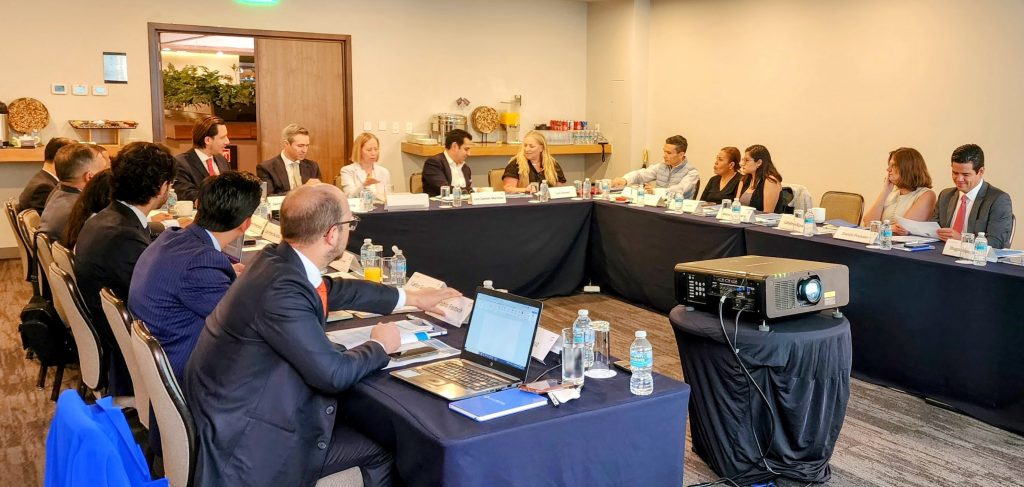
The Vance Center’s USMCA anti-corruption roundtable discussion in Mexico City, May 9, 2023. (Photo credit: Jaime Chávez Alor)
The frank, open conversation covered a range of topics such as the background and negotiation of Chapter 27, international cooperation, joint work between agencies, challenges, and opportunities for implementation. Key issues included:
- Non-judicial resolutions, their differences within the Mexican and U.S. systems, and the problems of unconstitutionality and lack of uniformity of corrupt conduct;
- The lack of protection and incentives for whistleblowers in Mexico, and opportunities to promote whistleblowing;
- The role of Mexico’s federal and state Anti-Corruption Prosecutor’s Office and the issue of reparatory agreements, as well as arrangements between the government and companies;
- Moving toward a culture of compliance, integrity, and anti-corruption behavior within the private sector.
Participants expressed their intention to continue supporting the fight against corruption in critical areas where it can have an impact, such as whistleblower protection.
The Vance Center, with support from the Chubb Rule of Law Fund, produced a policy brief that offers guidance to law firms, bar associations and other groups on specific efforts to implement USMCA Chapter 27. The policy brief is available here:
Latin America Anti-Corruption Assessment 2021-2022
Available in English, Spanish and Portuguese, the report identifies legal efforts and their shortcomings in preventing and redressing corruption in seventeen countries in the region...
Read moreLatin America Anti-Corruption Assessment 2021-2022
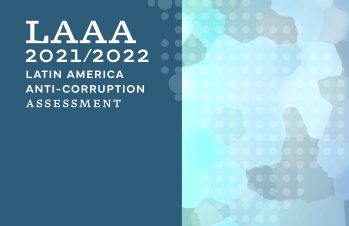
Available in English, Spanish and Portuguese, the report identifies legal efforts and their shortcomings in preventing and redressing corruption in seventeen countries in the region.
Mexico. Supreme Court Justices Appointments (Spanish)
The Vance Center’s Lawyers Council for Civil and Economic Rights published a call for action and a policy brief (available in Spanish) analyzing Mexico’s process for appointing Supreme Court Justices, in light of a vacancy that will occur at the end of the year. ...
Read moreMexico. Supreme Court Justices Appointments (Spanish)
The Vance Center’s Lawyers Council for Civil and Economic Rights published a call for action and a policy brief (available in Spanish) analyzing Mexico’s process for appointing Supreme Court Justices, in light of a vacancy that will occur at the end of the year.
Latin America Anti-Corruption Assessment 2020
Available in English, Spanish and Portuguese, the report identifies legal efforts and their shortcomings in preventing and redressing corruption in eight countries: Argentina, Brazil, Chile, Colombia, Guatemala, Mexico, Panama and Peru....
Read moreLatin America Anti-Corruption Assessment 2020
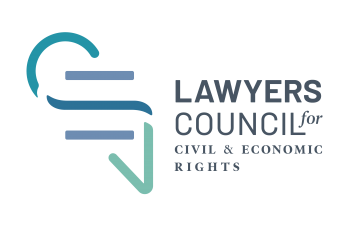
Available in English, Spanish and Portuguese, the report identifies legal efforts and their shortcomings in preventing and redressing corruption in eight countries: Argentina, Brazil, Chile, Colombia, Guatemala, Mexico, Panama and Peru.
Corruption in times of COVID-19: a regional perspective on public procurement
In this report, which provides a regional update as to public procurement in the pandemic, the Lawyers Council for Civil and Economic Rights is calling on the legal community throughout the region, including lawyers in the private sector (both law firms and companies), bar associations...
Read moreCorruption in times of COVID-19: a regional perspective on public procurement
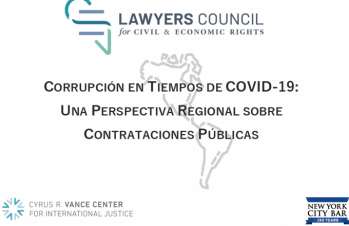
In this report, which provides a regional update as to public procurement in the pandemic, the Lawyers Council for Civil and Economic Rights is calling on the legal community throughout the region, including lawyers in the private sector (both law firms and companies), bar associations, pro bono clearinghouses and law schools, to be vigilant and active in support of anti-corruption efforts relating to COVID-19 and to work in support of civil society actors who are leading the fight for transparency and fairness.
Guatemala. Appointment process of Supreme Court and Court of Appeals Judges
2019 was a complex year in Guatemala, since for the first time in 33 years all three branches of government were undergoing re-selection. Members of the legal community expressed to the Vance Center concerns about the process of judicial appointments related to potential political infl...
Read moreGuatemala. Appointment process of Supreme Court and Court of Appeals Judges
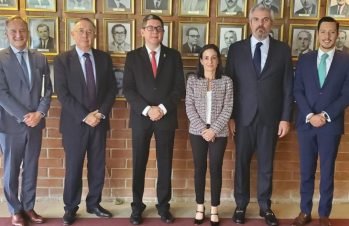
2019 was a complex year in Guatemala, since for the first time in 33 years all three branches of government were undergoing re-selection. Members of the legal community expressed to the Vance Center concerns about the process of judicial appointments related to potential political influence.
The Lawyers Council seeks to raise awareness of the process and promote the participation of the legal community in it, by strengthening the demand for transparency and accountability. Additionally, the Lawyers Council intends to further the discussion of needed structural reform to the judiciary in Guatemala.
A delegation of the Lawyers Council for Civil and Economic Rights undertook an assessment of the judicial appointment process in Guatemala. Delegates met with Guatemalan civil society organizations, members of the judiciary, the Association of Judges for Integrity, officers of the Guatemalan Bar Association, media representatives, and partners of principal law firms to gather information and offer recommendations on the ongoing process. Read more here.
You can read the report of the delegation in English here, and in Spanish here.
The Lawyers Council identified key considerations for the Nomination Commissions to comply with international and regional standards for the selection of members of the judiciary, based on international and regional standards as well as an analysis of comparative experience in the region. Download the document (in Spanish):
Peru. Appointment process of the National Justice Board members
The Lawyers Council identifies the process of appointment of the members of the National Justice Board as relevant for the rule of law in Peru and the Latin American region....
Read morePeru. Appointment process of the National Justice Board members
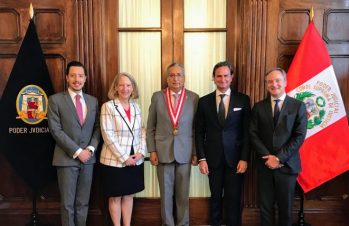
The Lawyers Council identifies the process of appointment of the members of the National Justice Board as relevant for the rule of law in Peru and the Latin American region. The National Justice Board is the new entity charged with appointing all Peruvian judges and prosecutors. The process resulted from a system-wide corruption scandal, popular referendum, and new legislation.
In April 2019 a delegation of the Lawyers Council visited Lima to observe, and present recommendations for selecting the members of the National Justice Board. See more.
The Lawyers Council provides recommendations based on international and regional standards as well as an analysis of comparative experience in the region, to support the ongoing process and contribute to overcoming the problems of influence peddling and corruption in 2018. Download document (in Spanish):
Projects
Analysis of the Implementation of Chapter 27, "Anti-corruption" of the USMCA in Mexico
Policy Brief from the Roundtable Dialogue...
Analysis of the Implementation of Chapter 27, "Anti-corruption" of the USMCA in Mexico
On May 9, 2023, the Vance Center convened a roundtable discussion in Mexico City entitled “Analysis of the Implementation of USMCA Chapter 27: Anti-corruption.”

Organizers and participants in the Vance Center’s USMCA anti-corruption roundtable discussion in Mexico City, May 9, 2023. (Photo credit: Jaime Chávez Alor)
The event drew a diverse set of participants, including public officials from specialized anti-corruption agencies, anti-corruption and compliance lawyers, members of civil society organizations, and employees of private sector companies, as well as experts in implementation of Chapter 27 of the United States-Mexico-Canada Agreement (USMCA).
Diego Sierra, partner at Von Wobeser, co-organized the event, representing the Mexican Bar Association and the Anti-Corruption Commission of the International Chamber of Commerce Mexico. Vance Committee member Ruti Smithline, partner at Morrison & Foerster, and Shearman & Sterling partner Sara Raisner brought a U.S. perspective to the discussion, which was moderated by Vance Center Latin America Policy Director Jaime Chávez Alor.
Public officials in attendance were Special Anti-Corruption Prosecutor Dr. María de la Luz Mijangos and Roberto Moreno, Executive Secretary of the National Anti-Corruption System (SESNA), the technical support body of the anti-corruption system’s Coordinating Committee.

The Vance Center’s USMCA anti-corruption roundtable discussion in Mexico City, May 9, 2023. (Photo credit: Jaime Chávez Alor)
The frank, open conversation covered a range of topics such as the background and negotiation of Chapter 27, international cooperation, joint work between agencies, challenges, and opportunities for implementation. Key issues included:
- Non-judicial resolutions, their differences within the Mexican and U.S. systems, and the problems of unconstitutionality and lack of uniformity of corrupt conduct;
- The lack of protection and incentives for whistleblowers in Mexico, and opportunities to promote whistleblowing;
- The role of Mexico’s federal and state Anti-Corruption Prosecutor’s Office and the issue of reparatory agreements, as well as arrangements between the government and companies;
- Moving toward a culture of compliance, integrity, and anti-corruption behavior within the private sector.
Participants expressed their intention to continue supporting the fight against corruption in critical areas where it can have an impact, such as whistleblower protection.
The Vance Center, with support from the Chubb Rule of Law Fund, produced a policy brief that offers guidance to law firms, bar associations and other groups on specific efforts to implement USMCA Chapter 27. The policy brief is available here:
Latin America Anti-Corruption Assessment 2021-2022
Available in English, Spanish and Portuguese, the report identifies legal efforts and their shortcomings in preventing and redressing corruption in seventeen countries in the region...
Read moreLatin America Anti-Corruption Assessment 2021-2022

Available in English, Spanish and Portuguese, the report identifies legal efforts and their shortcomings in preventing and redressing corruption in seventeen countries in the region.
Mexico. Supreme Court Justices Appointments (Spanish)
The Vance Center’s Lawyers Council for Civil and Economic Rights published a call for action and a policy brief (available in Spanish) analyzing Mexico’s process for appointing Supreme Court Justices, in light of a vacancy that will occur at the end of the year. ...
Read moreMexico. Supreme Court Justices Appointments (Spanish)
The Vance Center’s Lawyers Council for Civil and Economic Rights published a call for action and a policy brief (available in Spanish) analyzing Mexico’s process for appointing Supreme Court Justices, in light of a vacancy that will occur at the end of the year.
Latin America Anti-Corruption Assessment 2020
Available in English, Spanish and Portuguese, the report identifies legal efforts and their shortcomings in preventing and redressing corruption in eight countries: Argentina, Brazil, Chile, Colombia, Guatemala, Mexico, Panama and Peru....
Read moreLatin America Anti-Corruption Assessment 2020

Available in English, Spanish and Portuguese, the report identifies legal efforts and their shortcomings in preventing and redressing corruption in eight countries: Argentina, Brazil, Chile, Colombia, Guatemala, Mexico, Panama and Peru.
Corruption in times of COVID-19: a regional perspective on public procurement
In this report, which provides a regional update as to public procurement in the pandemic, the Lawyers Council for Civil and Economic Rights is calling on the legal community throughout the region, including lawyers in the private sector (both law firms and companies), bar associations...
Read moreCorruption in times of COVID-19: a regional perspective on public procurement

In this report, which provides a regional update as to public procurement in the pandemic, the Lawyers Council for Civil and Economic Rights is calling on the legal community throughout the region, including lawyers in the private sector (both law firms and companies), bar associations, pro bono clearinghouses and law schools, to be vigilant and active in support of anti-corruption efforts relating to COVID-19 and to work in support of civil society actors who are leading the fight for transparency and fairness.
Guatemala. Appointment process of Supreme Court and Court of Appeals Judges
2019 was a complex year in Guatemala, since for the first time in 33 years all three branches of government were undergoing re-selection. Members of the legal community expressed to the Vance Center concerns about the process of judicial appointments related to potential political infl...
Read moreGuatemala. Appointment process of Supreme Court and Court of Appeals Judges

2019 was a complex year in Guatemala, since for the first time in 33 years all three branches of government were undergoing re-selection. Members of the legal community expressed to the Vance Center concerns about the process of judicial appointments related to potential political influence.
The Lawyers Council seeks to raise awareness of the process and promote the participation of the legal community in it, by strengthening the demand for transparency and accountability. Additionally, the Lawyers Council intends to further the discussion of needed structural reform to the judiciary in Guatemala.
A delegation of the Lawyers Council for Civil and Economic Rights undertook an assessment of the judicial appointment process in Guatemala. Delegates met with Guatemalan civil society organizations, members of the judiciary, the Association of Judges for Integrity, officers of the Guatemalan Bar Association, media representatives, and partners of principal law firms to gather information and offer recommendations on the ongoing process. Read more here.
You can read the report of the delegation in English here, and in Spanish here.
The Lawyers Council identified key considerations for the Nomination Commissions to comply with international and regional standards for the selection of members of the judiciary, based on international and regional standards as well as an analysis of comparative experience in the region. Download the document (in Spanish):
Peru. Appointment process of the National Justice Board members
The Lawyers Council identifies the process of appointment of the members of the National Justice Board as relevant for the rule of law in Peru and the Latin American region....
Read morePeru. Appointment process of the National Justice Board members

The Lawyers Council identifies the process of appointment of the members of the National Justice Board as relevant for the rule of law in Peru and the Latin American region. The National Justice Board is the new entity charged with appointing all Peruvian judges and prosecutors. The process resulted from a system-wide corruption scandal, popular referendum, and new legislation.
In April 2019 a delegation of the Lawyers Council visited Lima to observe, and present recommendations for selecting the members of the National Justice Board. See more.
The Lawyers Council provides recommendations based on international and regional standards as well as an analysis of comparative experience in the region, to support the ongoing process and contribute to overcoming the problems of influence peddling and corruption in 2018. Download document (in Spanish):



